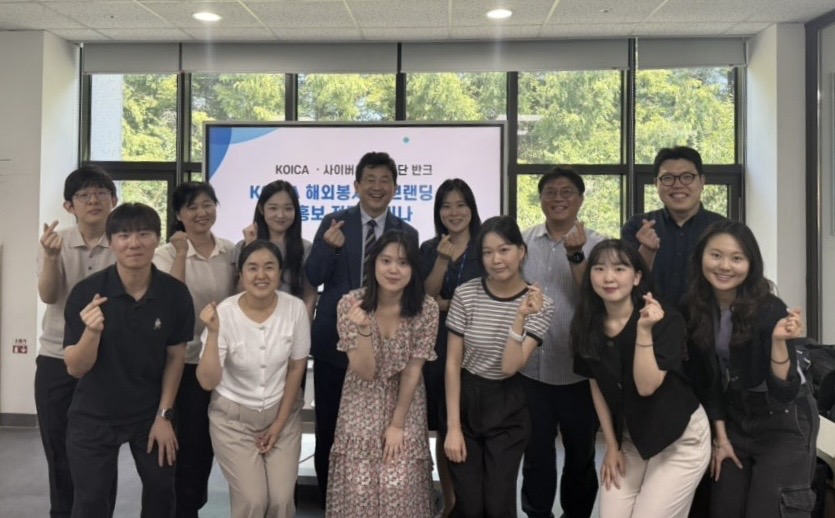
On July 10, 2025, Cyber Diplomacy Organization VANK and KOICA (Korea International Cooperation Agency) co-hosted a seminar on “Branding and Promotion Strategies for KOICA Overseas Volunteers” at the Korea Culture Foundation conference room in Yangjae-dong, Seocho-gu, Seoul.
The seminar aimed to combine the expertise and resources of both organizations to create synergy, enhance the brand value of KOICA’s overseas volunteer program, and seek improved strategies to maximize promotional impact. It is also expected to serve as a turning point for building concrete cooperation models through collaboration with VANK’s national policy platforms “Woollim” and “Yeollim” and its global network.
For over 30 years, KOICA has been engaged in technical assistance and capacity building in developing countries to improve economic and social development and quality of life. Its partnership with VANK is expected to boost the brand value of the volunteer program while expanding international outreach and public diplomacy.
The seminar was moderated by VANK researcher Koo Seung-hyun, with researcher Kwon So-young opening the discussion by presenting an overview of VANK’s major initiatives. She highlighted the organization’s efforts to nurture Korea PR ambassadors, its national policy platforms “Woollim” and “Yeollim,” and its collaborations with domestic institutions.
Introducing VANK’s Korea PR Ambassador Program, Kwon emphasized its cooperation with the Korea Heritage Service, Ministry of Foreign Affairs, and Ministry of Culture, Sports and Tourism to train youth as digital diplomats, metaverse diplomats, and global Korea PR ambassadors. She explained that this initiative aims to continuously enhance Korea’s national image and brand so that the country is positioned as “the center of Asia,” “the gateway to Northeast Asia,” and “a nation sharing dreams and friendships with the world.”
She went on to describe the policy proposal platform “Woollim,” where citizens directly submit ideas related to history, culture, tourism, and diplomacy, serving as a communication channel between government and people. The communication platform “Yeollim,” meanwhile, provides transparent access to government policies and content in these fields and allows the public to share feedback. “Through Yeollim, the public can understand government policies, while the government can refine them based on citizen feedback,” Kwon explained.
Kwon also presented VANK’s collaborations with government ministries, the National Assembly, and professional institutions, sharing the organization’s accumulated experience in hosting global strategy seminars.
In the next session, VANK researchers explored possible collaborations with KOICA and proposed ideas to promote the overseas volunteer program.
Youth researcher Park Ji-eun suggested supplementing KOICA’s current “professional-centered” recruitment model with a “role-divided team structure,” where participants are grouped into specialists, project managers, and content creators. She explained that this would allow young people to participate in ways that match their skills and majors, while enhancing both professionalism and efficiency of the program.
Youth researcher Lee Jeong-woo proposed a reels content idea titled “When You Go to KOICA (or WeKO)?!” parodying the popular song “When You Go to the Market.” She explained that fun, visually engaging content could attract more interest from young people compared to traditional text-heavy promotions.
Youth researcher Hong Dan-bi suggested an MBTI-based content series called “If I Become a KOICA Volunteer?” The idea involves recommending suitable volunteer roles and dispatch countries based on participants’ personality types, lowering psychological barriers and encouraging natural participation.
Youth researcher Jeong In-sung introduced the “KOICA Balance Game – Between Two Worlds,” where volunteers’ experiences are presented in a game format that compares cultures, environments, and service experiences across countries. Beyond entertainment, the content would focus on stories of empathy with local communities, overcoming cultural differences, and genuine value in volunteer work.
Researcher Koo Seung-hyun emphasized the role of KOICA volunteers as cultural ambassadors and proposed a joint “Global Korea PR Ambassador Program.” Before deployment, volunteers would undergo a three- to four-hour training session using VANK’s promotional content and case studies to equip them with practical strategies and guidelines for introducing Korea abroad. Returning volunteers would be appointed as “Global Korea PR Ambassadors” and awarded certificates, helping spread accurate knowledge and positive images of Korea worldwide.
Finally, Kwon So-young proposed strengthening volunteer participation in VANK’s national policy platforms. “Volunteers, with their diverse overseas experiences, have the potential to view Korea’s history, culture, diplomacy, and education policies from fresh perspectives,” she said. “By sharing feedback on platforms like Woollim and Yeollim even after their service ends, their experiences can continue contributing to public diplomacy rather than remaining one-time events.”
Closing the seminar, VANK Director Park Ki-tae said, “Although VANK and KOICA operate in different spheres—civil and public—we share the same mission: to communicate Korea’s values globally with trust and empathy. This seminar was meaningful in confirming practical possibilities for cooperation.”
He continued, “KOICA volunteers are not only technical experts but also cultural diplomats and Hallyu ambassadors, introducing Korea authentically through deep interactions with local communities. Each volunteer is a representative of Korea and its stories in the world.”
“Having promoted Korea’s history and culture globally for over 20 years, VANK is well-positioned to support KOICA volunteers in their mission to share Korea abroad,” he added.
KOICA Overseas Volunteer Management Team Leader Park Hye-rin noted, “This seminar showed how KOICA’s practical field experience and VANK’s expertise in digital diplomacy and global PR can be organically combined.” She expressed hope that the seminar would lead to attractive new content that effectively conveys the work of KOICA volunteers to Korean youth and encourages greater participation.
KOICA manager Kim Kwang-wook also remarked, “We hope this seminar will help VANK youth, who have been active in promoting Korea globally, expand their journey through KOICA volunteer activities and grow into leaders of positive change in the world.”